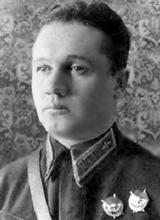Soviet Union

General-Major Yevgeniy Yefimovich Yerlykin HSU
Soviet Union

General-Major Yevgeniy Yefimovich Yerlykin HSU

1909 –
Yevgeniy Yerlykin was born in 1909.
He graduated from Borisoglebskaya Flight School in 1930.
Starshiy leitenant Yerlykin served in the Spanish Civil War, arriving in October and using the nom de guerre ’Pedro’.
In Spain he served in the Escuadrilla Rychagov, flying I-15s.
On 4 November, the I-15s were put in their first air-battles. There were four missions during the day.
Commanded by Petr Pumpur and starshiy leitenant Pavel Rychagov, I-15 fighters in squadron strength engaged the enemy planes over Carrabanchel during the day’s first mission. The Soviet pilots claimed four victories in the clash that lasted barely 10 minutes.
It seems that Yerlykin and Nikolay Mirosnichenko took part in this mission since it’s known that they made claims in the Madrid area in the morning when Yerlykin claimed a Ro.37 destroyed and Miroshnichenko claimed a shared CR.32 together with another pilot.
The aim of the second mission was to intercept six Ju 52/3ms escorted by fighters. Commanded by starshiy leitenant Rychagov the squadron shot down one Ju 52/3m.
During the third mission a squadron led by starshiy leitenant Georgiy Zakharov (in his first mission) fought against two flights of bombers, which were escorted by ten fighters. I-15s claimed one enemy fighter. There were no losses of I-15s even if it seems that Zakharov's I-15 was badly damaged. Of this combat, Zakharov recalled:
"Here I am above Madrid. I look around and there's no one there, neither friend nor foe. Then I scrutinize the horizon in the direction of the glaring sun. With flickering eyes I finally detect the remote shapes of friendly biplanes. Stressing my vision, I manage to count them 12! So Pavel must have decided to ensure the most favorable conditions for our attack, thus heading north of Madrid so as to lead the flight into the attack from down-sun, That’s where I should have looked for them right from the start.It seems that Zakharov is credited with one victory in this combat.
They approach the city in a wide arc and I am inside that arc, so I can quickly catch up, flying headlong towards them. I want to make my way towards the leading aircraft and take up my position on Rychagov's left. Well, I’ve been too hasty and popped up in front of the leader. Now I need to he spotted by my comrades, so I reduce speed and rock my wings. I believe they will see me and soon catch up. What happens next I still regard as being beyond my comprehension. I will forever remember that feeling, which is hard to explain in mere words, when the burst of enemy gunfire narrowly missed cutting off my wing. However, it was instinct that saved me, rather than training or rational thinking. Before I realized where I was and what was happening I had already swerved away into a steep turn to spoil the enemy’s aim. Yet I still felt I was a target, and I felt it with my entire physical being.
Today I see that the only reason I survived was that there were too many hunters after me. The entire swarm was engaged in pursuing me and they got in each other’s way. Otherwise, the first one to approach me from behind would easily have split my aircraft in two with his first burst. Instead, they all began to shoot erratically. My fighter was hit but I was alive! I was spinning between them while trying to draw them towards Madrid where, I felt, I could save myself. My comrades-in-arms would soon come to my rescue, I thought. The g-forces were almost blinding but I knew I couldn't give up and fly straight and level for more than a second! The aircraft had to withstand the punishment. I prayed that it wouldn't fall apart.
Three times Heinkels popped up into my gunsight and I pushed the firing buttons. And here I was, finally, approaching my airfield. Well, I could do better than reveal its location to the enemy, but I had no choice. My aeroplane’s bracing wires had been shot away and the wing curved upwards to the verge of collapse. I looked back, just in time to meet another blast of gunfire. My instrument panel was smashed and my upper machine guns were out of order. A Heinkel kept close behind me to finish me off, but I made it and landed from a hedgehopping approach.
The mechanics promptly pulled me out of the cockpit and we escaped to shelter under the nearest trees. I pressed my back against a tree-trunk and suddenly felt that my lips were being wetted - oh, it was just some water from a friend’s flask."
Yerlykin claimed a shared He 46 over Toledo with another pilot on 13 November.
Starshiy leitenant Pavel Rychagov was slightly wounded on 16 November and during his recovery, the Escuadrilla Rychagov was commanded by Petr Pumpur. The two detachments were in turn led by Yerlykin and starshiy leitenant Georgiy Zakharov.
Around 16:00 on 8 December 1936, leitenant Nikolay Miroshnichenko and starshiy leitenant Yerlykin (Escuadrilla Rychagov) claimed a shared Ju 52/3m over Alcala de Henares (20 km east of Madrid) while flying I-15s.
This was a Ju 52/3m from K/88 which was lost together with Unteroffizier Wilhelm Harjes and his crew.
On 2 January 1937, Yerlykin was decorated with the Order of the Red Banner.
In January 1937, two Chato flights commanded by Yerlykin and Anton Kovalevskii flew south to Malaga. A third Soviet pilot, Yemel’yan Kondrat, was also a member of one of the flights, but the remaining five pilots were Spanish.
On 2 February, the five remaining I-15s of the detachment from the Escuadrilla Rychagov (I-15) at Malaga flew out to explore the roads in the Roda-Burgo area. During the flight, they noticed three enemy fighters, identified as He 51s, flying from Seville to their airfield of Antequera (30km north of Malaga). They chased after them, catching them over the airfield. One of the Nationalist pilots turned towards the Republican fighters but all three were quickly shot down. The Nationalist pilot turning on them was shot down as a shared between leitenant Yemel’yan Kondrat and Viktor Matyunin. Leitenant Nikolay Artemyev claimed the second in flames while the third was claimed by Yerlykin, who reported that the combat started at 6,500 meters. Yerlykin’s I-15 was damaged in the combat.
The fifth pilot in the patrol was a Spanish pilot, who attacked one of the Heinkels head-on but his I-15 was seriously damaged with one of the cylinders in the engine destroyed. He managed, however, to return to base.
In the morning on 5 February, Yerlykin claimed a shared He 59 together with three other pilots over Malaga.
In mid-February, Yerlykin and Yemel’yan Kondrat were recalled from Malaga to the central theatre near Madrid, and the Spanish pilot Emilio Galeta was promoted to detachment commander.
Yerlykin left Spain on 27 March 1937.
During his time in Spain he claimed two and three shared victories flying the I-15.
He had flown 214 operational sorties and taken part in 80 air battles in Spain. It is known that he also flew “foreign” types of aircraft during his time in Spain.
He was decorated with a second Order of the Red Banner on 4 July 1937,
Podpolkovnik Yerlykin served in the staff of 59 IABR during the Soviet-Finnish Winter War.
On 21 March 1940, he was decorated with the Gold Star of the Hero of the Soviet Union and the Order of Lenin.
When Germany attacked the Soviet Union on 22 June 1941, he served in the staff of 5 SAD.
In September 1941, he was posted to the staff of 7 IAK-PVO.
As of 1 November 1942, he had flown 56 combat missions during the Second World War.
On 23 November 1942, he was decorated with a third Order of the Red Banner.
He left 7 IAK-PVO in June 1943 and in July he was posted to the staff of 6 IAK.
On 28 May 1944, he was appointed as CO of the Lipetsk VOASH.
He was decorated with the Order of the Red Star on 3 November 1944.
He ended the war as a general-major.
Claims:
| Kill no. | Date | Time | Number | Type | Result | Plane type | Serial no. | Locality | Unit |
| 1936 | |||||||||
| 1 | 04/11/36 | morning | 1 | Ro.37 | Destroyed | I-15 | Madrid area | Escuadrilla Rychagov | |
| 13/11/36 | 1/2 | He 46 | Shared destroyed | I-15 | Toledo | Escuadrilla Rychagov | |||
| 08/12/36 | 16:00 ca | 1/2 | Ju 52/3m (a) | Shared destroyed | I-15 | Alcala de Henares | Escuadrilla Rychagov | ||
| 1937 | |||||||||
| 2 | 02/02/37 | 1 | He 51 | Destroyed | I-15 | Antequera | Escuadrilla Rychagov | ||
| 05/02/37 | morning | 1/4 | He 59 | Shared destroyed | I-15 | Malaga | Escuadrilla Rychagov |
Biplane victories: 2 and 3 shared destroyed.
TOTAL: 2 and 3 shared destroyed.
(a) Ju 52/3m from K/88 shot down (crew KIA).
Sources:
Air Aces Home Page - Jan Safarik
Air War over Spain - Jesus Salas Larrazabal, 1974 Ian Allan Ltd, Shepperton, Surrey, ISBN 0-7110-0521-4
All aces of Stalin 1936-1953 – Mikhail Bykov, 2014
Condor: The Luftwaffe in Spain 1936-1939 - Patrick Laureau, 2000 Hikoki Publications, Ottringham, ISBN 1-902109-10-4
Polikarpov I-15, I-16 and I-153 Aces - Mikhail Maslov, 2010 Osprey Publishing, Oxford, ISBN 978-1-84603-981-2
Soviet Aces 1936-1953
Soviet airmen in the Spanish civil war 1936-1939 - Paul Whelan, 2014 Schiffer Publishing Ltd, ISBN 978-0-7643-0
Soviet Fighter Pilots 1936-1953 - Mikhail Bykov


